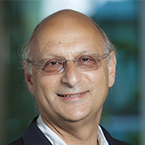
Discoveries by Dr. Kolodner have been fundamental to understanding human cancer susceptibility and cancer etiology. The majority of Dr. Kolodner’s research has been geared toward defining the role of DNA mismatch repair mechanisms and other pathways in the maintenance of genomic integrity, processes that prevent the occurrence of cancer-causing genetic changes.
To accomplish these research goals, Dr. Kolodner and his laboratory have used yeast (Saccharomyces cerevisiae) as a model system by which to study the genetics of mismatch repair, focusing on many different genes and the proteins they encode. These studies have demonstrated that inherited mutations in mismatch repair genes such as MSH2 are capable of causing cancer, specifically hereditary non-polyopsis colon cancer (HNPCC, also called Lynch syndrome). More specifically, Dr. Kolodner discovered that inherited mutations in genes such as MSH1 and MSH2 are responsible for over 50 percent of all HNPCC cases, whereas a smaller proportion of atypical HNPCC cases are attributed to MSH6 mutations.
In addition to identifying specific cancer-causing mutations, Dr. Koldner has also worked to identify the genes and pathways responsible for preventing accumulation of genetic insults such as chromosomal rearrangements. His work in this arena has elucidated the genetic and epigenetic basis of defects, including those related to DNA mismatch repair, in sporadic cancers beyond HNPCC. Together, these findings and those previously defined by Dr. Kolodner, continue to be used to develop novel diagnostic screening tests for various disease malignancies.
Career Highlights
2013 Elected Member, Institute of Medicine
2008 Elected Fellow, American Academy of Arts and Sciences
2007 Kirk A. Landon-AACR Prize for Basic Cancer Research
2006 Katharine Berkan Judd Award Lectureship, Memorial Sloan-Kettering Cancer Center
2002 Ernst W. Bertner Memorial Award, MD Anderson Cancer Center
2000 Elected Member, National Academy of Sciences, Washington, D.C.
2000 Mutation Research Award for Scientific Excellence
1998 Elected Fellow, American Academy of Microbiology
1996 Charles S. Mott Prize, General Motors Cancer Research Foundation
1994 Richard P. and Claire W. Morse Scientific Award, Dana-Farber Cancer Institute
1994 Sandoz Special Scientific Award
1992 MERIT Award, National Institutes of Health
1975 PhD, University of California, Irvine